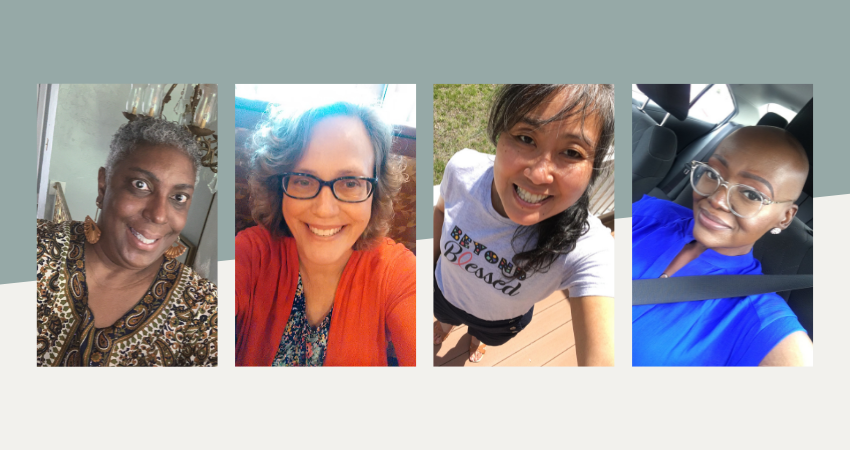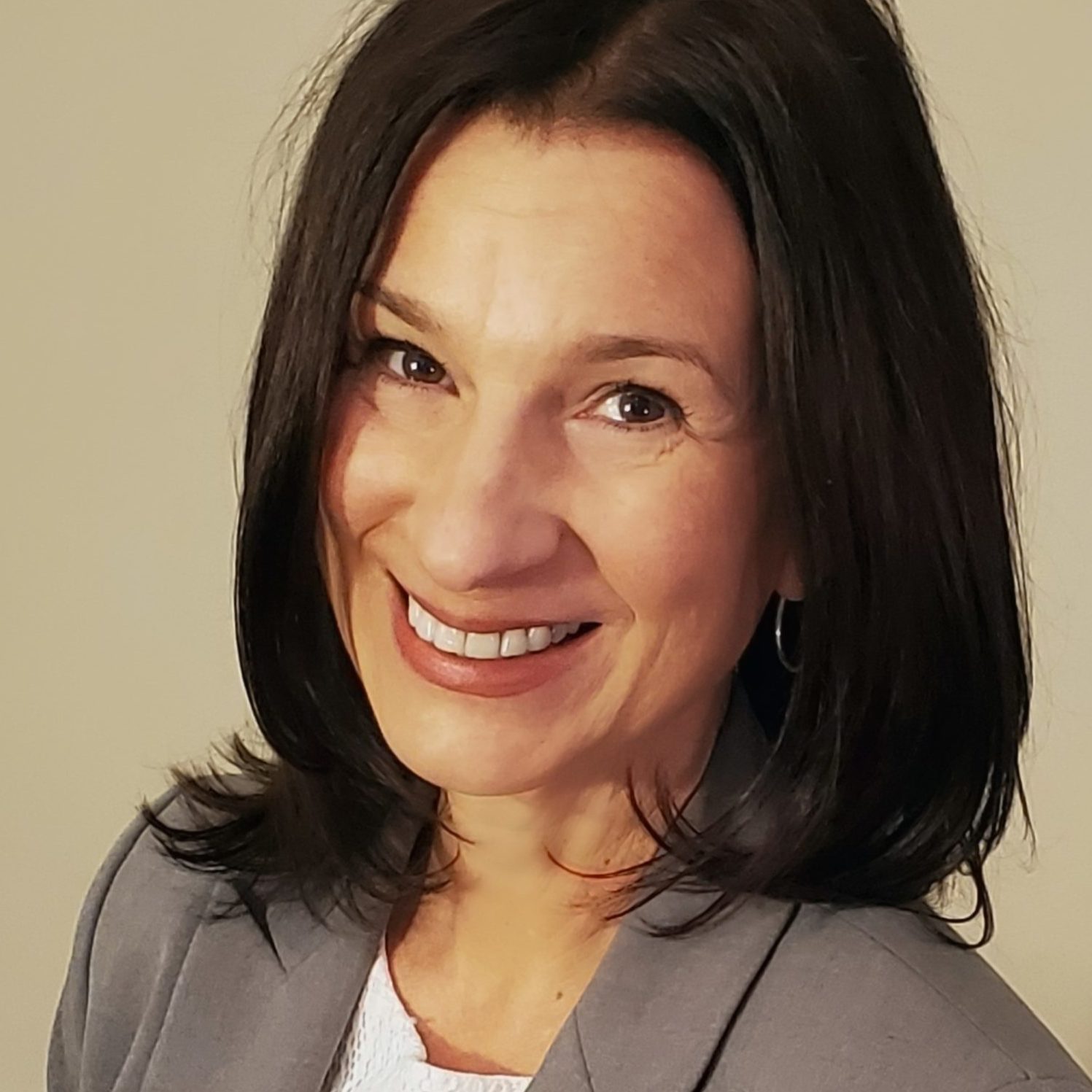The second annual Patient Advocacy Summit reunites LBBC leadership volunteers
Opportunities for change in advocacy propel discussion at virtual event
- 03/04/22

The need for humanizing the experience of patients in research, treatment, and survivorship were among the key topics of discussion at Living Beyond Breast Cancer's second annual Patient Advocacy Summit, held virtually on the evening of February 24, 2022. Registered participants attended the panel discussion, which featured Stephanie Walker, Martha Carlson, Shangrong Lee-Okwiya, and Shanta Burns, all current or former advocates from Living Beyond Breast Cancer’s three advocacy programs — the Hear My Voice Metastatic Advocacy Program, the Young Advocate Program, and the Breast Cancer Helpline Volunteers. The evening’s moderator was Arin Ahlum Hanson, LBBC’s director of outreach.
Catherine Ormerod, LBBC’s executive vice president, strategy and mission, sparked the evening’s discussion with: “In healthcare and in advocacy there are always opportunities to right wrongs, change systems, and confront disparities. The purpose of this meeting is to learn from each other and share ideas.” The panelists spoke about their personal experiences as advocates, the current state of breast cancer advocacy as well as future opportunities for change. After the panel, all the participants were divided into breakout rooms with LBBC staff in attendance to foster more intimate discussions in smaller groups. The evening ended with a discussion of the wide-ranging themes from the breakout rooms and news of upcoming events.
The current state of advocacy
The panel discussion demonstrated that, whether experienced or new, advocates are committed, engaged, and passionate. Says Shanta Burns, “Of all the different areas that we’ve learned, I don’t see one area I don’t want to be involved in.” Recently, patient advocates have been extremely successful in advancing positive changes across the full spectrum of the breast cancer experience. They serve the breast cancer community in diverse and evolving ways, from participating in clinical trials to contributing to the development of research, including seeking – and obtaining – funding for that research. Advocates like Stephanie Walker have dived into issues of diversity and inequity in healthcare, particularly for Black women in rural communities. Stephanie led the BECOME (the Black Experience of Clinical Trails and Opportunities of Meaningful Experience) project to address racial disparities in clinical trials. Martha Carlson emphasized the “amazing changes” she feels fortunate to have participated in, stating that now, “Patients are really leading the way for a lot of the important things that can happen in breast cancer research in general and metastatic research more specifically.” Patient advocates are also forcing attention to issues about the quality of life, she noted. “It’s come full spectrum." Significantly, it is often the patient advocate who brings new research findings to their physician. According to some of the advocates, some doctors, particularly in community settings, are too busy with patient care to keep pace with research. And yet 80% of the metastatic community, according to Stephanie, get their care from community settings.
Opportunities for change
Personalize the science. In terms of patient-driven research, the progress achieved by advocates involved in clinical projects has been notable. GRASP (Guiding Researchers and Advocates to Scientific Research) was highlighted as a successful collaboration between advocates and clinicians that was founded by two LBBC Leadership volunteer alums: Julia Maués and Christine Hodgdon. The BECOME patient survey was an initiative of the Metastatic Breast Cancer Alliance, led by Stephanie Walker to use patient data to provide practical and actionable ways to make it easier to get Black patients involved in research and clinical trials. Both these projects work to foster an interactive relationship between patients and scientists in research. Speaking of scientists in the labs, Stephanie said, “They don’t see us often. They’re stuck in the labs with the mice.” She added that, despite their life-saving work, she wanted them to "remember the human face,” as they go about their research. Because the work scientists conduct in their labs affect people impacted by breast cancer and their quality of life, advocates work to ensure that the patient perspective is included at every step of research from identifying the problem and conceptualizing the solutions to weighing in on the outcomes and recruiting for clinical trials; all the way through to bringing a therapy to market. The panel and the audience agreed patients need to be valued and integrated at every step.
Humanize advocacy. More advocates, and a broader spectrum of people, are needed across advocacy so that all voices and interests receive equity to further advance connection and community while helping to prevent volunteer burnout for advocates; however, more volunteers is not enough. Advocates need to feel valued. The panelists and participants in breakouts engaged in substantial discussion about their role as patient advocates and suggested changes that could be promoted to show advocates recognition and appreciation. For example, registration fees could be waived for relevant volunteer opportunities as many volunteers face financial toxicity. Lack of communication also plagues volunteers of breast cancer organizations. A lack of basic contextual information and feedback leaves many advocates feeling isolated and disconnected, particularly given the pandemic. Regular programmatic updates would improve the sense of connection between advocates and their organizations.
There were many other issues raised during the Summit. High on this list was the need for collaboration and communication across breast cancer groups because many advocates simultaneously work with multiple organizations. BECOME and GRASP were discussed as potential models for facilitating communication among advocacy groups. There was discussion on the accessibility of clinical trials in general, but more particularly, how the exclusion of minority populations, people with brain metastasis, and some common medical conditions might be addressed. Younger women with breast cancer want more education around their needs and challenges. LBBC and other organizations should consider providing mentorship opportunities for advocates to guide people interested in advocacy but unsure how to get involved. Organizations that have “changed the conversation” around breast cancer research, treatment, and care were held up as examples. While many were encouraged by the increased inclusion of advocates into the research process, others were frustrated by the slow pace of real system change, particularly for those living with metastatic breast cancer.
It's up to us
This year, LBBC’s Patient Advocacy Summit offered a space for committed volunteers to share their insights about the direction of advocacy and how they can work to improve the patient experience. The need for connection and community led many people to turn to advocacy as they sought to transcend their own personal experience of breast cancer and work to help others yet to be diagnosed. Advocacy, for many of these volunteers, means more than disseminating information and resources, it means driving their own care. That includes sharing vital information about advocacy’s challenges. During this evening, the participants shared their valuable perspectives with their colleagues. As Shangrong said, “We’re all on the same team, we can share that same goal.”
If you are interested in learning more about patient advocacy and how you can get involved, LBBC’s Leadership Volunteer programs are a great place to start.
Thank you to the Summit's sponsors




